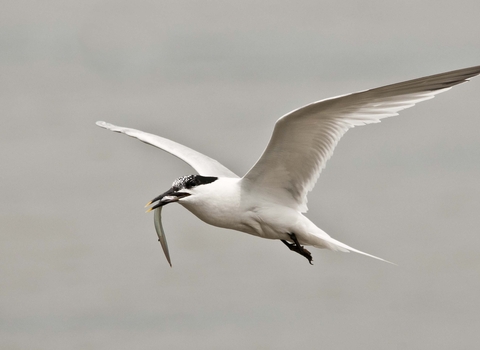
©Bertie Gregory/2020VISION

©Bertie Gregory/2020VISION
Sandwich tern
Found around our coasts during the breeding season, the large Sandwich tern can be spotted diving into the sea for fish such as sandeels. It nests in colonies on sand and shingle beaches, and islands.
Scientific name
Sterna sandvicensisWhen to see
March to SeptemberSpecies information
About
The Sandwich tern is a relatively large tern, which breeds in colonies on sand and shingle beaches, islands and spits. Sandwich terns feed on fish, such as sandeels, sprats and whiting, which they catch by diving into the water.How to identify
The Sandwich tern is whitish-grey above and white below, with a large black cap (the forehead becomes white in winter) and a shaggy, black crest. It has short, black legs, and a black bill with a yellow tip. It has a short tail without 'streamers' (long feathers extending past the main tail).Distribution
A summer visitor to sandy beaches and islands around our coastline, particularly in the south and east of England.In our area
Cemlyn Nature Reserve hosts the only colony of Sandwich terns in Wales. However, without 24/7 protection during the breeding season, there is every chance that the colony will fail. We need £20,000 every year to provide this protection.
Did you know?
Named after Sandwich Bay in Kent, the Sandwich tern is one of three birds to be named after Kent - the others are the Kentish plover and the Dartford warbler.Cemlyn Nature Reserve hosts the only colony of Sandwich terns in Wales. However, without 24/7 protection during the breeding season, there is every chance that the colony will fail. We need £20,000 every year to provide this protection.
